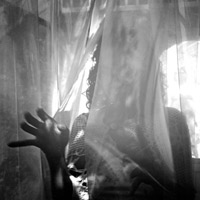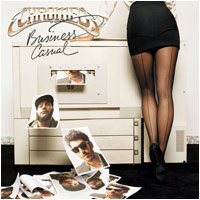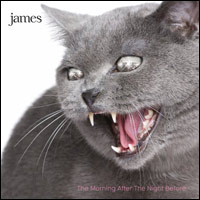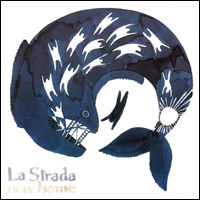
Crush
PostPresentMedium
Crush doesn’t fit into the script that the press has pre-written for a band like Abe Vigoda. According to the LA-scene rulebook, they were supposed to put out a ton of music in a short amount of time with the world latching on to one of their records (2008’s Skeleton) because of its kitschy aesthetic (ridiculously defined by some as “tropical punk”) and then either fall off the planet or fade away. After all, the average lifespan of a band like Abe Vigoda ranges from half a decade to just a couple of months.
But then how can you explain Crush? The group’s fourth full-length more or less abandons the twangy, waterlogged chimes that we all thought made Abe Vigoda who they are and embraces an entirely different set of influences that takes the band in new and utterly enthralling directions. Gone is anything remotely “West Coast,” instead they’re embracing the off-trail splendor of icy Europop, ragged, industrious post-punk, and the noisy intangibles of indie indecipherables like Xiu Xiu. The vocal channel has been evacuated of any haze; each of Michael Vidal’s drowned, hovering wails sound as clean as can be, with no wobbling echo to be found. Juan Velazquez’s leading, bouncy guitar work is gone, replaced now by an aquatic synthesizer. Abe Vigoda don’t really sound like Abe Vigoda anymore, and that’s a good thing—really.
Of course all that departure would be inconsequential if Crush wasn’t any good. Thankfully, the band still retains their remarkably envisioned songwriting voice. They’ve always been original and groundbreaking, but now they’re being original and groundbreaking in ways they haven’t been before. From melancholy electro-ballad “Throwing Shades” to the rumbling coldwave anxiety of “Dreams of My Love (Chasing After You)” and from jaunty surf-punk banger “To Tears” to circular synth-epic “Repeating Angel” (that last one has a bid for being the best song Abe Vigoda have recorded), they’re making great, unique music. Abe Vigoda has progressed from charming standout of an insular scene to something much more seminal.
Luke Winkie

Album of the Year
Fat Beats/Decon
Black Milk (Curtis Cross to his friends) is a rarity in hip-hop these days as he’s an actual legitimate rapper who's still much more widely acclaimed for his beatmaking. Maybe the only other member of his peer group is Kanye, who, like Black Milk, is also the de facto leader of a Midwestern hip-hop scene. Thus, it’s even more interesting that Milk’s flow suddenly sounds so much like Kanye’s. (Which is to say, of course, that it sounds like an angry mash-up of Lupe Fiasco and Rhymefest.) His beats, though, owe a lot more to Dilla—and thank goodness for that. That side of him is even more developed on Album of the Year, and you’ll hear it most on funkadelic tracks like “Warning” and “Keep Going.” Most advanced since his last solo release, though, is his work on the drums. They sound more authentic and natural and they dominate most of the cuts with heady syncopation and live-sounding snares and hi-hat fills.
Living up to its title, the album is indeed one of the strongest hip-hop releases yet this year, and there are a ton of quotable moments. One of the best comes from Royce da 5'9" on “Deadly Melody”: “You can’t take the heat? Get your ass out of the kitchen. Matter of fact, get your ass back in there and wash the dishes.” Then he goes into some double-time rapping and brags about how he’s not even trying yet. He’s pretty damn convincing, too.
Rough times, rough rhymes, I guess. “Fuck this year, I’m done with 0-9,” Black Milk expectorates halfway through “Distortion” over a trap-heavy beat with a bassline worthy of Billy Cox and a hook (courtesy of Melanie Rutherford) so deep it’s more like a harmonic texture than a chorus. “Distortion” is the track on which Milk most clearly articulates his troubles, while on most of the rest of the album he’s making you feel them. You’ll feel his anger, his pain, and his determination to push through all that. As if braggadocio could help him rise above it all, Milk spends almost all of three tracks (“365,” “Welcome (Gotta Go),” and “Round of Applause”) finding new ways to explain precisely how much he dominates hip-hop in his particular time zone. By the time he reaches the end of the record, he might as well be taking victory laps.
Matt Slaybaugh

Business Casual
Atlantic
When recent and upcoming movie releases include The A-Team, The Karate Kid and The Smurfs, it’s safe to say ’80s nostalgia is in full swing. Enter Business Casual, the third release from Chromeo, the Montreal duo of P-Thugg (Patrick Gemayel) and Dave 1 (David Macklovitch). While 2007’s Fancy Footwork was comprised of catchy funk-flavored dance tracks, the latest album takes a step—make that about four steps—to decidedly retro. The robo-swagger of “Hot Mess” is kicked off by a woman proclaiming, “You’re a hot mess. You act like you’ve not nothing to lose. But I’ve already lost my temper.” It’s patience, however, that might be lost if not prepared for the total ’80s immersion. We’re talking about some of the most saccharine sounds of the decade, such as searing pop guitar solos and Vocoders, which the duo seems to use nearly as liberally as Ke$ha uses Auto-Tune. Even the album’s title has something subliminally ’80s about it—an echo of Phil Collins’ No Jacket Required perhaps?
If you’re conjuring the decade of excess and “greed is good,” then over-the-top may seem apropos. It’s all in good fun; Chromeo doesn’t seem to take themselves too seriously. It’s hard to resist some of the danceable cuts, like “The Right Type,” which could proudly be the opening song to a TV series starring Tom Selleck, William Katt or Bronson Pinchot. Or maybe Tom Hanks in drag or some of the cast of Hunter. When Dave 1 pleads, “Lady, why do you always frown and act all jaded?” in “I’m Not Contagious,” the intonation and backing track sounds similar to Pebbles’ query from decades ago (“Girlfriend, how could you let him treat you so bad?”).
“Night by Night” is a wink to “Eye of the Tiger,” but just past the 2:20 mark, it turns into more of a yawn. It also conjures up images of these people dancing. (If retro trends progress, eventually the point in time at which hipsters started heavily borrowing from previous trends for irony’s sake will be reached, causing some sort of pop culture implosion.) However, it’s not all like being beat over the head with a boombox by someone in a Members Only jacket. “J’ai Claqué La Porte” is a simple French ballad, and “Don’t Turn the Lights On” has a bit of the restraint found on Fancy Footwork. Overall, Business Casual is pure fun (totally), but the kitsch gets old quick. It would make more sense to dust off an old Wham! or Sheila E. cassette.
Josie Rubio

Skit I Allt
Mexican Summer
You’d be forgiven for thinking that Swedish wunderkind Dungen had taken a laidback approach to making their new album, Skit I Allt. Hell, the title is Swedish for “What the fuck?” And the light pastoral tones that decorate the record’s first four tracks could certainly give that first impression. But even the gilded lilt of “Vara Snabb”—emphasized by a flute no less—is underscored by a thick layer of vintage guitar sludge.
Dig deeper into this record, and you’ll be surprised at everything you turn up. The piano, handclaps, swells of strings and, again, flute on “Min Anda Van” might seem wispy in comparison to the heavy, lysergic guitar rushes of past records, but they are part of a grander scheme. Take “Brallor,” for example. Here, the band shifts between similarly gossamer verses and bouts of fuzzy overdrive. On “Hogdalstoppen,” Dungen goes deeper, finding a wordless groove that brings these varied strains together before blasting out into further realms. As it turns out, there was definitely an overarching plan at work (one that might be easier to figure out with a knowledge of the Swedish language), and its brilliance is revealed the more one indulges in this record’s glory.
Stephen Slaybaugh
MP3: “Marken Låg Stilla”

The Morning After the Night Before
Universal
The selective short-term memory when it comes to the ’90s alternative music scene has been particularly brutal for British bands. If you’re not New Order, Blur or Oasis, the casual music fan may have trouble remembering that you exist. As a result, a band like James consistently falls through the cracks. However, James is owner of one of the most enduring early ’90s radio jams: “Laid,” the “risque” hit from the gold-selling album of the same name. Some may recall earlier minor hit “Sit Down,” but beyond that it’s a blank stare.
It’s curious for a band that started in the ’80s with two EPs on legendary Factory Records and who then released seven studio albums, a handful more EPs and a trio of live albums. After the band disbanded in 2001, they reunited for a tour and new album in ’08. But unless you were actually in England at the time that factoid may come as a surprise. Undaunted by the disconnect and eager to re-introduce the band, James’ U.S. label has packaged the band’s most recent EPs together as The Morning After the Night Before.
In their original incarnation, the “mini-albums” were released four months apart, with The Night Before appearing first. But now the order has been flipped. For most releases, it really wouldn’t matter, but in this case each EP has a distinctive mood. The Morning After is the more melancholy of the two, as contrasted with the more knees-up of The Night Before. Sequencing can at times be a lost art, but this release points out how important it can be. If you take the two EPs as one complete thought, The Morning After serves as the early morning black and white introspection before recalling the Technicolor night out. If you flip it, it becomes the comedown. It’s a subtle difference, but it goes to show that the EPs weren’t just a slapdash collection of songs; there was actually some thought behind it.
But concept aside, The Morning After the Night Before shows why James was at one point thought to be the “next big thing.” Lead singer Tim Booth’s voice is in fine form, with the band deftly blending everything from high lonesome pedal steel to electronic-driven soundscapes and relatively straightahead rock. It’s like a concise overview of their entire career, helping to not only re-insert James into the conversation of “important” British bands, but also showing their influence on some of the current crop. No matter which way you play it, The Morning After the Night Before is a great return.
Dorian S. Ham

New Home
Ernest Jenning
You wouldn’t guess it on first or second listen, but La Strada has a fairly peculiar songwriting formula. I mean, it’s quite clear what want to be. They’re a Brooklyn quintet who’ve clearly spent a lot of time submerged in the forever-hip and forever-acceptable relics of Nick Drake, the Smiths, and (probably less) REM, and who come out sounding a lot like what we’ve come to define as modern indie pop. Yuppie chart-crashers Ra Ra Riot and the Shins are only a stone’s throw away.
But La Strada can’t be defined that easily. It’s hard to explain, but their latest record, New Home is a subversively complicated album, incorporating more sounds, structures and melodies than your average generic New York indie band would ever dream of trying. It starts off simple enough; the record’s first two tracks, “Go Forward” and “Julia,” are pretty but otherwise unremarkable pop songs. You might make the mistake (I did) of writing off the band too soon, because after that is “Wash on By,” which incorporates a skittering breakbeat, multi-part string harmonies and a fuzzy, potentially-synthesized harmonica. You aren’t going to hear too many bands try something like that, but it isn’t until two songs later, with “My New Home,” where things really fall into place. The tracks keeps the string and percussion acrobatics of “Wash on By,” but even they take a backseat to the stunning vocal melody, featuring the most gorgeous “whoa-oh” chorus this side of “Wake Up.” It’s really not surprising that the band took their album’s namesake from the song as it’s easily the best they’ve written and one of the best I’ve heard all year.
Nothing after “My New Home” comes close, but it’s hard to really blame them for that. After all, songs like that don’t come around too often, and the remaining tracks on the album are all, at the very least, interesting. (A curiously prominent accordion reappears on both “There’s Only Love” and “Where You Want To Go.”) Unlike, say, Edward Sharpe, La Strada’s centerpiece isn’t weighed down by gallons of filler, and for that they deserve some props—and for delivering a really good record.
Luke Winkie
ALBUM REVIEWS
The Thermals, Personal Life
Wait. Think. Fast. Luces del Sur
Winter Gloves, All Red
The Intelligence, Males
Mice Parade, What It Means to Be Left-Handed
The Vaselines, Sex with an X
Interpol, Interpol
Electric Sunset, Electric Sunset
Sam Prekop, Old Punch Card
Blonde Redhead, Penny Sparkle
Jenny Wilson, Hardships!
Titles, Dirt Bell
Film School, Fission
Megafaun, Heretofore
